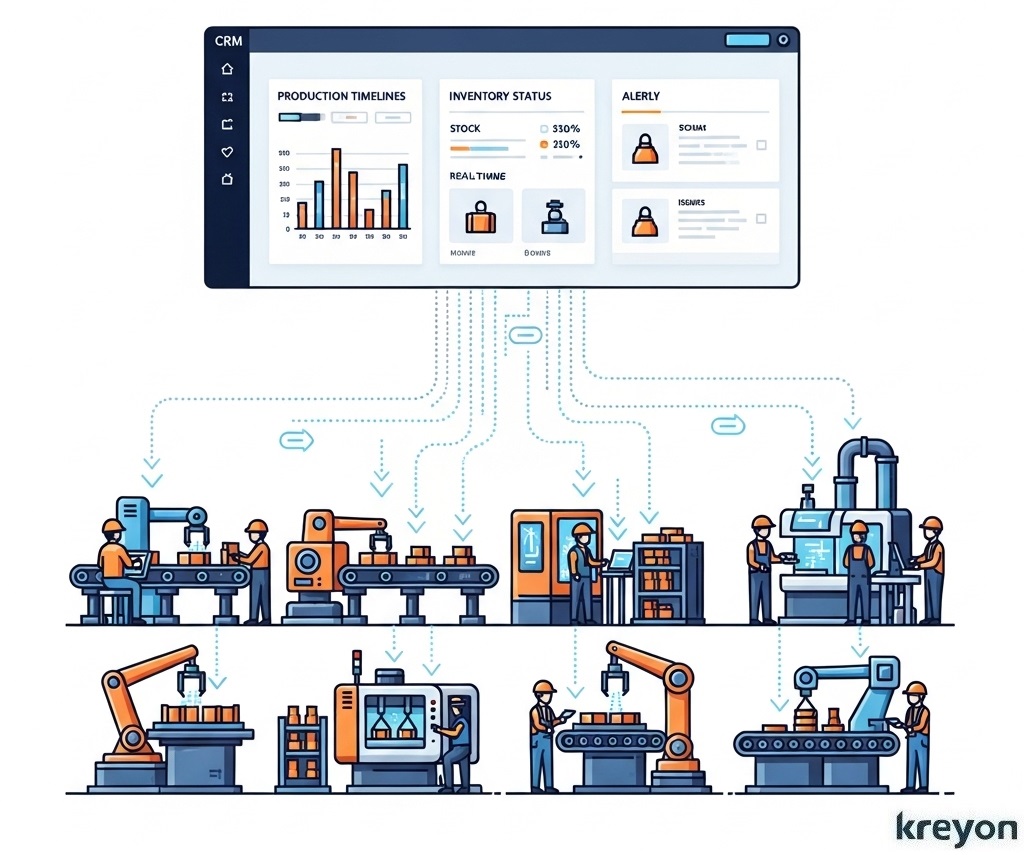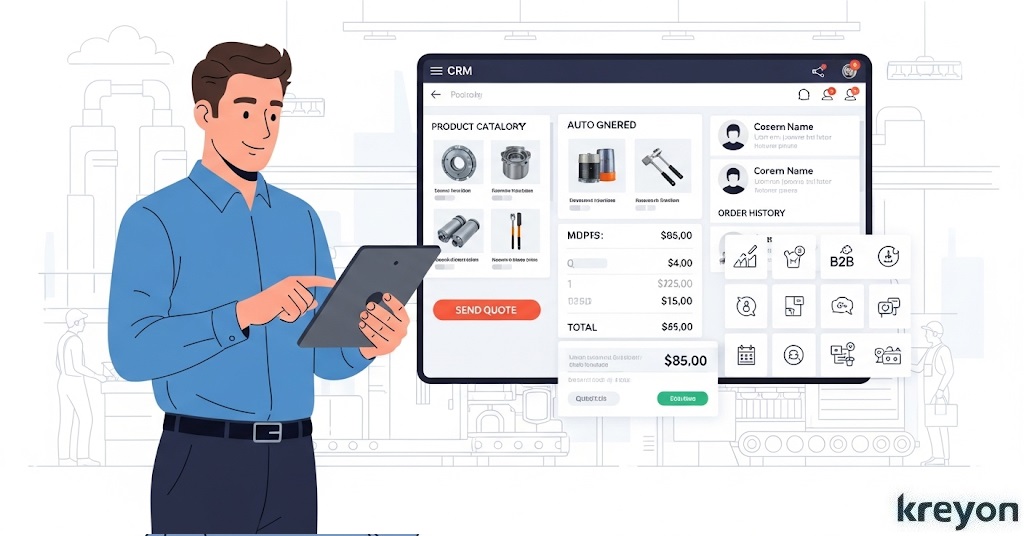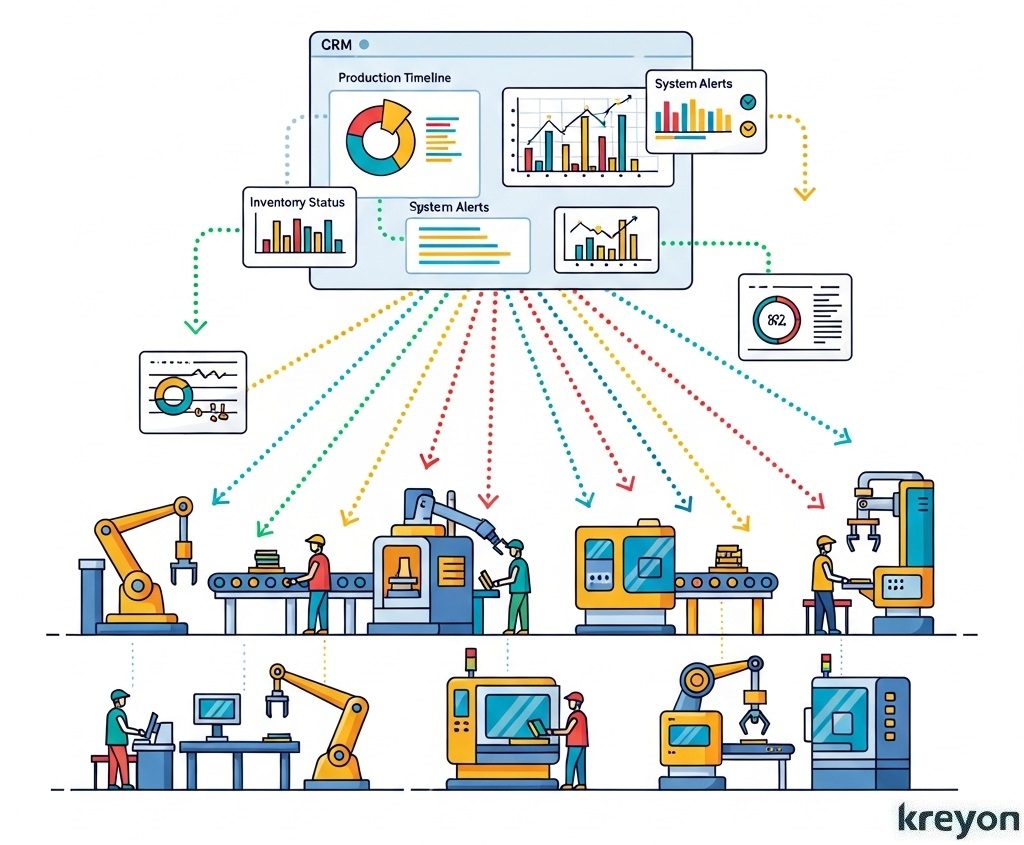Streamlining Operations with Custom CRM for Manufacturing: A Complete Guide
 Picture a bustling factory floor where orders flow smoothly, customer queries get instant answers, and production stays on track without hiccups. Sounds too good to be true? It’s not, it’s what a custom CRM for manufacturing can do.
Picture a bustling factory floor where orders flow smoothly, customer queries get instant answers, and production stays on track without hiccups. Sounds too good to be true? It’s not, it’s what a custom CRM for manufacturing can do.
Unlike those one-size-fits-all CRMs, a tailored system built for manufacturers turns chaos into calm, helping you stay ahead in a cutthroat industry.
From keeping tabs on your supply chain to building stronger client relationships, a custom CRM for Manufacturing industry is like the glue that holds everything together.
In this guide, we’ll dive into why a custom CRM for manufacturing is a must-have, how it tackles the unique challenges you face, and the practical steps to make it work for your business.
Whether you’re running a small shop or a global operation, you’ll find actionable ideas to streamline your processes and boost your bottom line.
Why Manufacturers Can’t Rely on Generic CRMs
Manufacturing isn’t just about making things, it’s about juggling raw materials, tight schedules, and demanding customers.
Off-the-shelf CRMs like Salesforce or HubSpot are great for general sales teams, but they often miss the mark for manufacturers. A custom CRM for manufacturing is designed with your world in mind, tackling the nitty-gritty challenges that keep you up at night.
Solving the Manufacturing Puzzle
Ever dealt with scattered customer data or delayed orders that frustrate clients? You’re not alone.
A 2023 Gartner report found that 68% of manufacturing leaders struggle with poor data integration, which drags down efficiency Gartner, 2023.
A custom CRM fixes this by pulling all your data, sales, production, inventory, into one place.
Imagine a system that flags low stock the moment a customer order comes in or warns you about a production delay before it snowballs. That’s the kind of clarity that keeps customers happy and costs down.
Why Custom Beats Generic Every Time

Generic CRMs are like trying to fit a square peg in a round hole, they focus on sales and marketing, not the nuts and bolts of manufacturing. A custom CRM for manufacturing brings:
Workflows That Fit: Automate tasks like turning quotes into orders or running quality checks, saving you time and headaches.
Growth-Ready Design: Scales with you, whether you’re producing small batches or running global plants.
Seamless Connections: Hooks up with your ERP, IoT devices, or supply chain tools for a unified operation.
Must-Have Features for a Manufacturing CRM
So, what makes a custom CRM for manufacturing stand out? It’s all about features that speak to your daily grind. Here’s what you need to look for:
1. Real-Time Order and Inventory Sync
A great CRM ties your orders to your inventory like peanut butter and jelly. When a customer places an order, the system checks raw materials instantly, flags shortages, and updates production schedules.
No more overpromising or running out of stock. Forbes reported that manufacturers using integrated CRM-ERP setups slashed inventory costs by up to 20% Forbes, 2024.
2. Automated Production Workflows
Manufacturing is a chain of steps, quotes, production, delivery. A custom CRM automates these, so your sales team can whip up accurate quotes while production gets instant updates.
For example, it can ping quality control when a batch is ready, cutting down on delays and ensuring compliance.
3. Smarter Customer Relationships
Repeat business is gold in manufacturing. A custom CRM for manufacturing keeps track of every call, email, and order, so you can personalize your approach.
Got a client who always orders custom parts? The CRM can nudge your team with upsell ideas based on their history.
4. ERP and IoT Integration
Today’s factories lean on ERP systems and IoT gadgets for real-time insights. Your CRM should play nice with platforms like SAP or Oracle NetSuite and connect to IoT sensors on the shop floor.
This setup can predict machine issues before they halt production, boosting uptime by 15%, according to a 2024 McKinsey study.
5. Data You Can Actually Use
Numbers tell a story. A custom CRM gives you dashboards with key metrics, think order fulfillment rates or production bottlenecks, so you can spot issues and plan smarter. It’s like having a crystal ball for demand forecasting.
How to Get Your Custom CRM Up and Running

Building a custom CRM for manufacturing isn’t a plug-and-play deal, but with the right approach, it’s smooth sailing. Here’s how to make it happen:
Step 1: Know What You Need
Start by getting real about your pain points. Are your sales reps bogged down with manual data entry? Is production missing deadlines because of miscommunication?
Bring in your sales, production, and IT teams to map out what’s not working. A furniture maker might need a CRM to track custom designs, while an auto parts supplier might focus on supply chain sync.
Not sure where to start? Our post on Streamlining Manufacturing Workflows has some great tips.
Step 2: Pick a Partner Who Gets It
You need a developer who knows manufacturing inside out. Companies like Kreyon Systems, with experience in several industries like healthcare, energy & retail, can craft a CRM that fits your needs.
Down to regulatory details like ISO standards, GDPR & compliance regulations for various authorities as per needs.
Step 3: Build for Integration
Your CRM should talk to your existing tools, ERP, accounting software, IoT platforms.
Linking it with something like Microsoft Dynamics 365 keeps data flowing smoothly between sales and production. Test these connections early to dodge headaches later.
Step 4: Test, Train, Repeat
Roll out the CRM to a small team first and listen to their feedback. Then train everyone, showing them how the system makes their lives easier, like giving sales real-time inventory data to avoid overpromising. Hands-on demos work wonders.
Step 5: Keep It Fresh
Once it’s live, track how it’s performing. Are orders moving faster? Are users actually using it? Use the CRM’s analytics to spot bottlenecks and tweak workflows. Regular updates keep it aligned with your growing business.
Custom CRM for Manufacturing Delivers
A mid-sized metal fabricator was drowning in manual order tracking, causing late deliveries and grumpy customers.
Kreyon Systems built a custom CRM for manufacturing that linked orders to their ERP, cutting processing time by 30%. Real-time stock alerts also slashed shortages by 25%, keeping clients smiling.
Another automotive parts giant with 10 facilities used a custom CRM to unify customer data. The system’s analytics helped sales spot upsell opportunities, boosting revenue by 15% in a year. IoT integration also cut machine downtime by 10%, keeping production humming.
Dodging Common Roadblocks

A custom CRM for manufacturing can be a game-changer, but it’s not without challenges. Here’s how to tackle them:
Roadblock 1: Team Pushback
Change is tough. Employees might drag their feet on a new system. Get them on board early by showing how it cuts busywork. Hands-on training and cheat sheets help seal the deal.Roadblock
2: Upfront Costs
Custom CRMs aren’t cheap, but they pay off. Deloitte found that manufacturers using them cut operational costs by 12% within two years Deloitte, 2024. Start small with a phased rollout to ease the budget hit.Roadblock
3: Data Migration Woes
Moving old data to a new system can be messy. Work with your developer to clean and organize data first. Automated tools can keep errors to a minimum.
Your Path to Smarter Operations
A custom CRM for manufacturing isn’t just software, it’s your ticket to smoother operations, happier customers, and a healthier bottom line.
By tackling your unique challenges with features like order tracking, ERP integration, and smart analytics, it keeps you nimble in a tough market. Whether you’re a small shop or a global player, the right CRM can make all the difference.
Kreyon Systems’ custom CRM streamlines your business. Stop fitting into a generic CRM. Get a custom solution built for how you manufacture, sell, and grow. For queries, please contact us.
